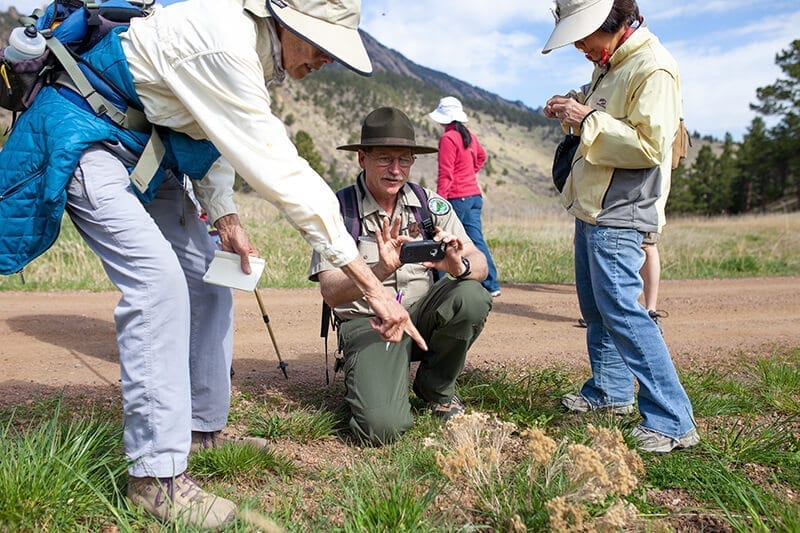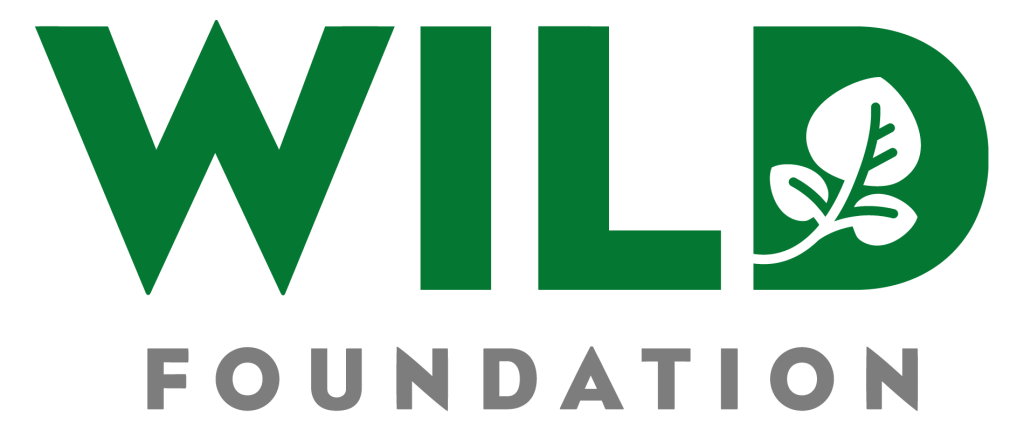Want to join the 2022 City Nature Challenge? Contact the Denver-Boulder organizers for more information!
 Which city has the most nature?
Which city has the most nature?
The 2021 City Nature Challenge will help us find out! Last year Denver Metro Area competed against 244 cities throughout the globe and came up with some impressive numbers:
- 5,847 total observations
- 838 plant and wildlife species identified
- 443 observers
- 373 identifiers
Throughout the globe, 41,165 observers from 244 cities collected 814,258 observations of 32,500+ species (including more than 1,300 rare/endangered/threatened species) during the four-day bioblitz! Read more about the 2020 results and view some of the standout observations from the Denver-Boulder region.
Help us show the world how biodiverse our region is by documenting observations of wild plants and animals from April 30 – May 3, 2021! Document nature in your home, backyard, neighborhood, or nearby parks or trails during off hours, and upload your observations to iNaturalist, an online platform for citizen scientists. Any observations of plants, animals, and fungus found throughout our boundary will count.
About the City Nature Challenge
The City Nature Challenge (CNC) is an ongoing project to document urban biodiversity and engage city residents in the nature around them. The project is framed as a competition between cities to see which can make the most observations, identify the most species, or have the most participants. The program was started in 2016 by the Natural History Museum of Los Angeles and the California Academy of Sciences as a competition between Los Angeles and San Francisco.
The 2021 City Nature Challenge will take place from April 30– May 9. The first four days, April 30 – May 3, are the days that observations will be collected (aka the Bioblitz), and the last six days, May 4 – May 9, are when those observations will be identified and verified. Participants can also continue to upload observations during this six-day period as long as the sightings took place during April 30 – May 3.
City Nature Challenge Events
WATCH NOW: Louisville & Lafayette Open Space Webinar
Webinar led by Louisville and Lafayette Open Space divisions
Learn how to use iNaturalist, a free interactive tool to explore, document, and conserve biodiversity in your backyard and around the world. Once an iNaturalist user, you can participate in the Spring 2021 City Nature Challenge, a global effort with a local component in the open spaces, parks, and backyards of Louisville and Lafayette!
This program is jointly hosted by the Louisville and Lafayette Open Space divisions. Louisville Senior Natural Resource Specialist, Dr. Steve Roels, will introduce the iNaturalist platform and how aspiring citizen scientists can get started exploring their communities. Also inspiring local residents to become citizen scientists will be: 1) Lafayette resident and author of the Smithsonian Field Guide to the Birds of North America, Ted Floyd; 2) Ted’s daughter and Centaurus High School student, Hannah Floyd; and 3) Dave Sutherland, retired naturalist from Boulder City Open Space and Mountain Parks!
After watching the webinar, you will be prepared to join the free City Nature Challenge, running April 30–May 9.
Watch the recording here: www.youtube.com/watch?v=YFlJkYChEnc
April 22, 5:00-6:00pm: Boulder County Parks & Open Space Webinar
Webinar led by Boulder County Parks & Open Space: Discover iNaturalist and the City Nature Challenge
iNaturalist is a wonderful website where people shares images of wildlife and plants. Boulder County has its own project page, and we also participate in an annual bioblitz through iNaturalist that helps document as many plants and wildlife that we can find in one weekend! Discover some good tips about how to participate in iNaturalist in this virtual training and then jump in to join the City Nature Challenge for Boulder County April 30-May 3!
Registration required at www.BoulderCountyOpenSpace.org/register. Zoom link will be sent to those registered the day before.
April 21, 6:30-8:00pm: Intro to iNaturalist Webinar
Intro to iNaturalist Webinar presented by Audrey Spencer
iNaturalist is a tool to help you identify observations that you make in the field. Whether you’re new to iNaturalist or you just need a refresher course, join us for this free webinar!
Note: Please visit iNaturalist.org to create an account and download the mobile app prior to the event.
Attend this event here. No registration necessary.
May 1, 10:00am - 2:00pm: Waneka Centennial Farm Bioblitz
Bioblitz led by the Butterfly Pavilion and the City of Lafayette Open Space
Be a citizen scientist in Lafayette! Join Amy Yarger and Ashley White, Horticulture Director and Horticulture Coordinator, respectively, at The Butterfly Pavilion, to help conduct a bioblitz at Waneka Centennial Farm. Amy and Ashley will help volunteers conduct a baseline study of flora and fauna at the farm as part of the City Nature Challenge using iNaturalist. No previous experience is necessary, but if you want to get a head start on using iNaturalist or City Nature Challenge, participate in a March 30 webinar.
This event is open to a limited number of people, so RSVP early by contacting Martin Ogle at Martin@EntrepreneurialEarth.com.
*Participants must wear face masks and practice safe social distancing.
Where can you go to make observations in Denver-Boulder?

The Denver-Boulder Metropolitan Area City Nature Challenge encompasses Adams, Arapahoe, Boulder, Broomfield, Denver, Douglas, and Jefferson Counties.
In short: anywhere wild nature exists! Document wild nature in places such as:
- Your backyard and neighborhood
- City/neighborhood parks
- Open space, mountain parks, and natural areas
- State parks
- Urban areas
- And more!
In light of the COVID-19 pandemic, we ask that participants please be respectful of all people and wildlife around you, follow all social distancing requirements, and abide by local land and facility closures. Avoid overcrowded areas and instead visit popular trails during off days/times.
Remember that your own backyard is teeming with wild nature! Your home is a complex ecosystem and contributor to the larger landscape. Be sure to spend lots of time in your yard and/or neighborhood exploring the diversity of plants, birds, insects, mammals, and other wildlife coming through at all hours. You might meet some neighbors you never knew you had!
*If you are concerned about revealing the location of a sensitive organism (or where your house is), you can hide the exact location from the public by changing the “geoprivacy” of the observation to “obscured.”
Why should you participate?
There is nature all around us, even in our cities! Knowing what species are here and where they are helps us study and protect them, but the ONLY way to effectively do that is by working together (scientists, land managers, community members, you name it) to find and document nature in our area. By participating in the CNC, not only do you learn more about local nature, but you can also make our urban areas a better place – for you and other species!

Get involved!
There are many ways that you can get involved with various levels of commitment. Some suggestions are listed below. If you are interested in contributing in any way, do not hesitate to contact us!
Spread the word
Whether it’s informing your email lists, posting on your Facebook or Twitter accounts, distributing some of our posters and flyers, or just telling your friends, it all helps. The more promotion CNC has the more successful it will be!
Offer extra credit to students
We realize the CNC takes place right before finals week for many universities in the area. Offer extra credit to your students by encouraging them to take a study break to get out into nature and contribute to the Denver-Boulder CNC.
Host a virtual event
Teach others how to use iNaturalist, challenge others to a friendly competition, host a City Nature Challenge presentation or webinar…the possibilities are endless!
Make it a class project
If you’re an educator, you could create an assignment to get your students outside and teach them the value of citizen science. They don’t even have to put their phones down!
Make observations
Whenever you’re outside between April 30 – May 3, whether you’re on a hike, walking the dog, or taking the trash out, pause a moment to observe the nature around you. You might discover something you’ve never noticed before!
Sponsor the Denver-Boulder CNC
Make a donation or sponsor a prize for iNaturalist participants. We’re looking for items like binoculars, a variety of outdoor gear, nature guide books, outdoor attire, gift cards, and more.
Make species identifications
We can only count observations toward our project if they are identified down to the species level by 11:59pm on May 3. We will need lots of help assigning those IDs as the observations roll in! You could do this in your PJs from your couch, or you could make it a social event by planning a virtual ID party.
Resources for the City Nature Challenge
For educators and parents
- iNaturalist Teacher’s Guide
- City Nature Challenge Education Toolkit
- Signs of Spring Bingo (courtesy of City of Boulder Open Space & Mountain Parks)
- Boulder County Wildlife Scavenger Hunt (WILD Foundation)
Regional guides
- iNaturalist guides for the greater Denver Metro Area
- 50 birds to know in Denver (courtesy of Denver Audubon)
- Tracks & Scat: Mammals of Chatfield (courtesy of Denver Audubon)
- Reptiles & Amphibians of Colorado (courtesy of COPARC)
- Quick Key to Amphibians and Reptiles of Colorado (courtesy of CPW)
- Colorado Insect Identification
- Boulder County Field Guides & Brochures
Other
- Denver-Boulder City Nature Challenge Guide
- Exploring nature in and around your home (City Nature Challenge)
- iNaturalist video tutorials
- Getting started with identifications (iNaturalist)
- How to become a better identifier (iNaturalist)
- iNaturalist Training Guide (Colorado Parks & Wildlife)
2021 Event & Outreach Partners
Boulder County Parks & Open Space
Butterfly Pavilion
Colorado Native Plant Society
City of Boulder Open Space & Mountain Parks
City of Lafayette Open Space
City of Louisville Open Space
University of Colorado Boulder
How to contribute observations
*While any observation will count, we encourage you to only upload wild and non-captive observations. Please, no photos of people, pets, or potted-plants.*
*If you are concerned about revealing the location of a sensitive organism (or where your house is), you can hide the exact location from the public by changing the “geoprivacy” of the observation to “obscured.*





